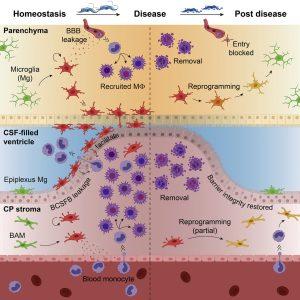In a new study, researchers have described and created a detailed map of the immune system in the brain and how reacts to infection (Figure 1). Interestingly they showed how the brain is initially protected by brain-resident macrophages which are effective at recruiting macrophages from the blood that in turn help regulate the immune response and contain spread of the infection. The map describes how there are various types of immune cells involved in defending the brain against infections.
This study highlighted the important of understanding the dynamics of host-pathogen interactions due to the long-term neurological consequences suffered by individuals who have recovered from infections in the brain. The researchers were able to highlight how cells in the brain change following infection and remain changed following healing.
The team made us of Trypanosoma brucei, a dangerous pathogenic microorganism which targets the brain and studied its effects using a murine model. They were able to show how the parasite initially invades the meninges and the choroid plexus, and subsequently invades the fluid-filled cavities and the neuronal tissue. During this process they were able to map the immune system to see how the immune response works during infection.
A very interesting finding was that they were able to show that the brain has a “memory,” of the infection as the border regions of the brain retain a more activated state following the removal of the parasite.
This study leads to interesting thought around how we can develop improved therapies to treat infection-induced neurological complications.
Journal article: De Vlaminck, K., et al., 2022. Differential plasticity and fate of brain-resident and recruited macrophages during the onset and resolution of neuroinflammation. Immunity.
Summary by Stefan Botha











